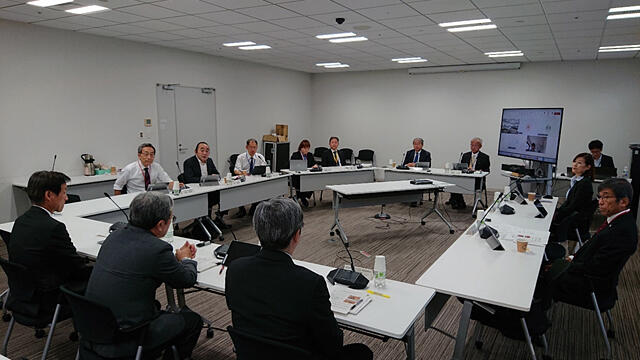Areas such as Silicon Valley and London produce waves of successful startup firms and so are known as "startup ecosystem hub cities." To what extent has Japan succeeded in creating such cities? In July 2020, the Cabinet Office, the Ministry of Education, Culture, Sports, Science and Technology, and the Ministry of Economy, Trade and Industry selected eight hub cities. Now that four years have elapsed since then, Tokyo has gained 10th place in the world rankings, and initiatives in each city are progressing well. However, venture capital investment is disappointing compared to the rest of the world. Few globally profitable startups have been created. What should be done in the next phase? The expert panel of the Council for Science, Technology, and Innovation (CSTI) has begun to discuss the issues.

In June 2019, the three organizations formulated "Strategies for creation of startup ecosystem to compete with the world top ecosystems." In 2020, they selected a total of eight regions. The regions selected for global hub cities are as follows: the Startup Ecosystem Tokyo Consortium (Tokyo, Shibuya City, Kawasaki City, Yokohama City, Ibaraki Prefecture, Tsukuba City, Chiba City, etc.); the Central Japan Startup Ecosystem Consortium (Aichi Prefecture, Nagoya City, Hamamatsu City, etc.); the Osaka-Kyoto-Hyogo-Kobe Consortium (Osaka City, Kyoto City, Kobe City, etc.); and the Fukuoka Startup Consortium (Fukuoka City, etc.). For hub promotion cities, the following regions were selected: Startup Frontier HOKKAIDO (Sapporo City, etc.); Sendai Startup Ecosystem (Sendai City, etc.); the Hiroshima Regional Innovation Strategy Promotion Council (Hiroshima Prefecture, etc.); and the Kitakyushu SDGs Startup Ecosystem Project (Kitakyushu City, etc.).
Each city has been involved in a range of initiatives, including events involving large-scale pitch contests and publicity. Promotions matching businesses have been held with overseas venture capitalists. Local promotions have been held overseas to attract startup-related institutions. Inter-city cooperation agreements ranging beyond the boundaries of the hub cities have been signed. Manufacturing companies' technologies have been matched with ideas from startups, so as to foster innovation. Co-creation consortia involving multiple companies and institutions have been established. Practical educational programs have also been implemented to support stakeholders.
These efforts helped Tokyo rank 10th in the Global Startup Ecosystem Report ranking. The Chubu region recorded 20,327 people aspiring to start businesses and engage in innovation. The Kyoto-Osaka-Kobe area created more than 800 startup firms, and Fukuoka issued 114 startup-related visa approvals. Furthermore, in Sapporo, the number of startups from universities in Hokkaido reached 129. In the Sendai area, the cumulative number of successful startups reached 370. In the Hiroshima area, the percentage of companies engaging in innovation-related activities reached 54%, and in the Kitakyushu area, 73 startups were created. In other words, a startup ecosystem is being successfully formed in Japan.
On the contrary, Tokyo was the only Japanese city among the global top 40 in the world ranking of genome companies. Although it ranked 10th in 2021, it dropped to 15th in 2023. At the global level, 15 of the top 40 startup ecosystems are in the U.S., 9 in Western Europe, 4 in China, 3 in India, 3 in Canada, and 2 in Australia. These countries have multiple ecosystems. In terms of performance (exits, startup success, etc.), Tokyo lags far behind Beijing and Seoul. The same hold true for funding (quality and quantity of investment, and access to funding). Fundraising, especially, is vital for startups to succeed. However, the amount of domestic funds raised for startups in 2023 was only 753.6 billion yen, lower than the record-high previous year and the year before that.
The key is to attract foreign venture capitalists for large investments; however, this is not an easy process. The key performance indicators set for each hub city will terminate at the end of this fiscal year. Since July of this year, workshops have been held to bring together officials from each city. Going forward, consideration will be given to policies to elevate Japan's startup ecosystem to a global standard. These considerations will take into account the opinions of those on the ground.
Hiroaki Suga, a part-time councilor (Professor at the University of Tokyo) said, "When I talk to American venture capitalists, they tell me that going public in the U.S. is a prerequisite. Companies listing in Japan would only achieve access to approximately 10 billion yen. In overseas markets, the available funding would be in the order of 100 billion yen. Moreover, in Japan, systems are in place for startups to succeed in IT and AI, but we need to create successful models for firms dealing in materials and biotechnology. We need alliances in these areas."
This article has been translated by JST with permission from The Science News Ltd. (https://sci-news.co.jp/). Unauthorized reproduction of the article and photographs is prohibited.




